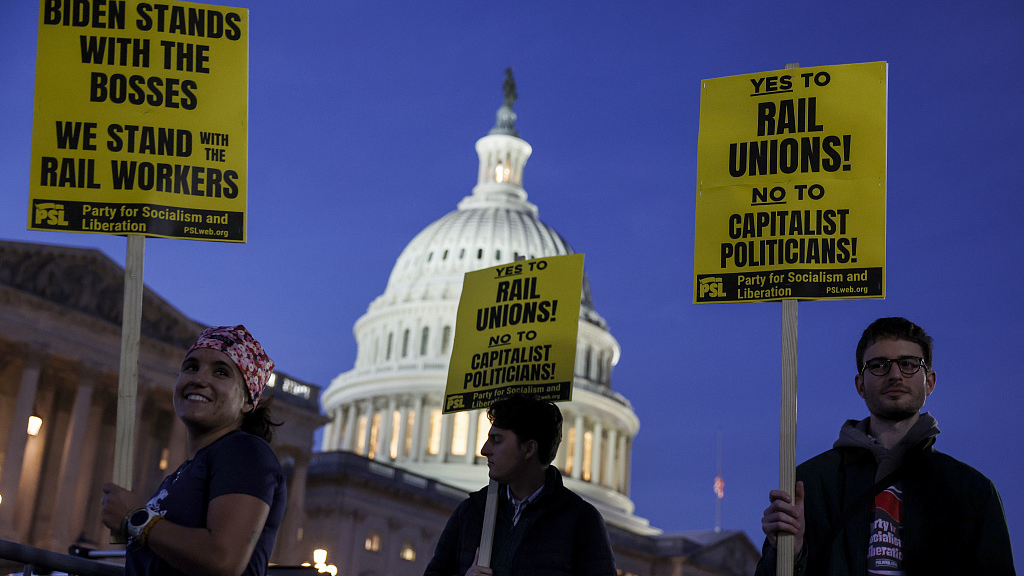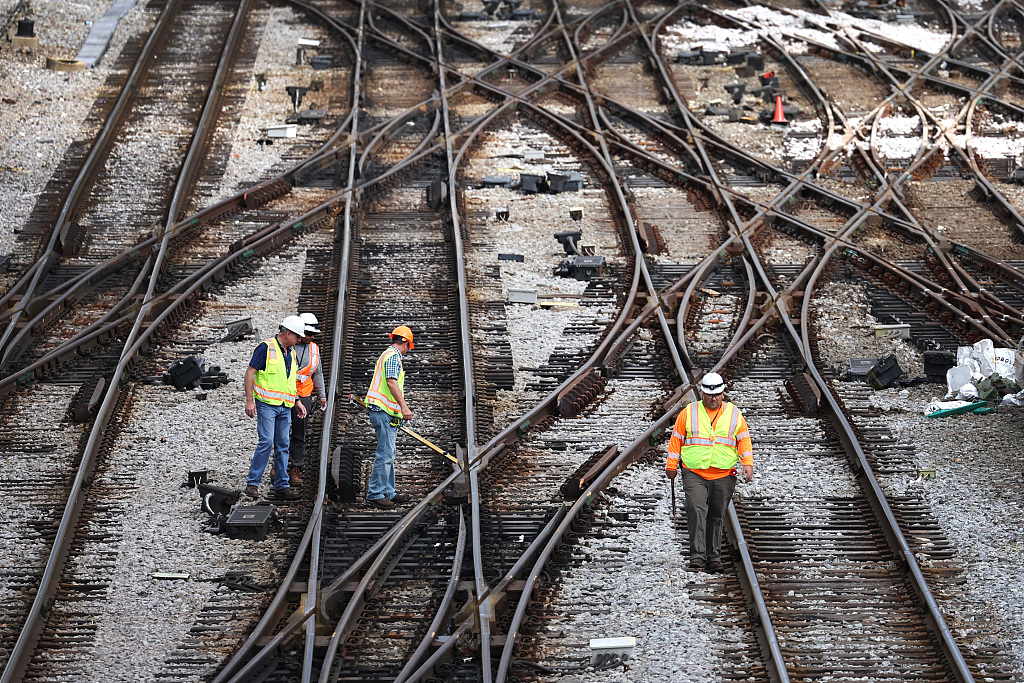
Activists in support of unionized rail workers protest outside the U.S. Capitol Building in Washington, D.C., U.S., November 29, 2022. /CFP
Activists in support of unionized rail workers protest outside the U.S. Capitol Building in Washington, D.C., U.S., November 29, 2022. /CFP
Editor's note: Bradley Blankenship is a Prague-based American journalist, political analyst and freelance reporter. The article reflects the author's opinions and not necessarily the views of CGTN.
The United States is seeing the highest inflation rate since 1981. Average people see their savings and buying power evaporate as prices skyrocket for basic goods, including fuel and food. Yet, another development could throttle this existing problem to a new and unprecedented level: a national railway strike.
The main issue for rail workers is paid sick leave. As it stands, rail workers in many cases are forced to be on call seven days a week with the threat of job loss. Workers can't make doctor's appointments, handle medical emergencies or even see the birth of their children because rail operators demand constant availability. In September, the White House brokered a deal between unions and employers that would see a large wage increase – but paid sick leave and other quality-of-life issues, such as addressing the fact that rail workers often have to operate lines alone, which is a significant safety concern, were absent from the deal.
Most recently, unions voted against this deal even though it included a cool 14 percent raise with back pay and annual thousand-dollar cash bonuses. Given the ongoing COVID-19 pandemic that is knocking out significant portions of the workforce at any given time and causing people to be sick frequently as cases plateau, paid sick leave is the primary sticking point.
On December 1, the U.S. Senate rejected a proposal to give these workers seven days of paid sick leave by a vote of 52-43. That is, a majority of workers are demanding this, the majority of Americans broadly support giving it to these workers (and they also support universal sick leave) and a majority of the Senate voted for it. But it failed to pass through Congress because of the strange rules of the Senate, namely the filibuster, wherein any legislation essentially requires a supermajority of over 60 votes to pass anything.
If no agreement is reached by next week, a coordinated strike will start on December 9, as four rail unions have aligned on, according to CNN. Afterwards the U.S. could see a national rail strike that would hit the U.S. economy with $2 billion in damages per day and could affect up to 30 percent of the nation's cargo. The entire U.S. supply chain, from motor vehicles to fuel, could be brought to its knees and inflation might skyrocket to unfathomable levels.
But to be clear, the onus of this situation would have been on the corporations that own the railways – not on the workers bargaining for decent working conditions. Meanwhile, rail operators have been enjoying sky-high profits on the back of pandemic-induced supply chain woes. Rail companies have not distributed this wealth to their workers via increased pay or restructured contracts that offer greater benefits, like paid sick leave. Instead, they have paid out stock dividends and artificially boosted their stock prices with buybacks.

Workers service the tracks at the Metra/BNSF railroad yard outside of downtown, in Chicago, Illinois, U.S., September 13, 2022. /CFP
Workers service the tracks at the Metra/BNSF railroad yard outside of downtown, in Chicago, Illinois, U.S., September 13, 2022. /CFP
Due to the way laws are structured in the United States, only a handful of rail companies privately own the nation's freight lines. These companies also enjoy unprecedented exemptions from anti-monopoly laws, which has been demonstrated through the arbitrary fees they charge for freight that is not connected to any market activity, and workers have significantly less leverage than most any other industry thanks to the 1926 Railway Labor Act, which in practice essentially forbids workers from striking in most cases. Congress has the legal authority to intervene on behalf of employers to prevent a strike.
And that is exactly what happened. The House and Senate both passed their versions of a bill, again, on December 1 that will prevent a national rail strike – but it did not include any provision for paid sick leave. President Joe Biden signed the bill to prevent a rail strike – and the attendant collapse of the country's supply chain – ahead of the holiday season on December 2. In effect, rail workers will have a contract that the unions didn't vote to support and the American public broadly does not support to be imposed on them.
The way this situation played out demonstrates in no uncertain terms how the United States is a functional plutocracy, e.g., a government run by and for the wealthy. Rail workers demanded a provision that most other comparable Organization for Economic Co-operation and Development countries enjoy to an even greater extent and would have cost their employers a tiny percentage of their record-setting revenue, namely just seven days of paid sick leave (in the context of a once-in-a-century pandemic) and not being forced to work 14+ hours per day alone.
Instead, despite the fact that all the major unions were in favor of this, that the American public supported it and that both chambers of Congress voted for it in a majority, they were left empty-handed and will be forced to work regardless of their legitimate disagreements. It goes to show that the U.S. is not a legitimate democracy that reflects the will of the people.
(If you want to contribute and have specific expertise, please contact us at opinions@cgtn.com. Follow @thouse_opinionson Twitter to discover the latest commentaries on CGTN Opinion Section.)